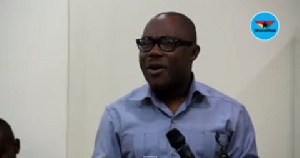An associate professor of the University of Ghana, Ransford Gyampo, has raised concern about China’s intense interest in Africa, stating the East Asian nation is engaged in both covert and overt means to relegate all other interests in Africa.
Though he said the most important external partner of Africa and the Africa Union over the years has been the EU, he observed China appears to be intruding and clamouring for Africa.
“It appears China is doing everything possible surreptitiously and overtly, to out-do and completely relegate European as well as other interests in Africa to the background,” Prof Gyampo said at a lecture on the future of European Union-Africa relations.
The lecture, which is the 7th of series and organised by the Centre for European Studies of the University of Ghana was to discuss how Europe is positioning itself to relate with Africa in the future, in the wake of the Chinese zeal to nearly take over Africa.
Many people have in recent times raised similar concerns about China’s sudden interest in Africa and questioned how the populous nation has been using aid and loans as bait to lure Africa nations to its side.
Their concerns were heightened by Chinese takeover of Sri Lanka’s port over the latter’s inability to pay up its debt arising from huge loans.
Similar reports surfaced last year of how China was preparing to takeover Kenya’s largest port in Mombasa over what was said to be debt-trap diplomacy. Kenya has reportedly accepted some 4.9 billion dollars from China since 2013.
From Prof Gyampo’s analysis, China appears prepared to take over Africa through the offering of aid to many African governments “without orthodox stringent conditionalities”.
“They are building huge edifices, including libraries, lecture theatres, and other academic facilities in many African tertiary educational institutions freely. They are also engaged in several maneuverings purposefully to spread the Chinese culture,” he observed.
Prof. Gyampo who is the Director of the Centre for African Studies said the joint Africa-EU Strategy signed in 2007, coupled with other key accords, such as the Cotonou Agreements, have provided orientation and guiding frameworks for EU-Africa relations and partnership dialogue.
“Europe remains an important partner to Africa with regards to direct foreign investment, trade as well as foreign development aid. In addition, Europe offers Africa support in the development of an inclusive democratic systems, without which there would be no peace and sustainable development on the African continent,” he said.
He noted that the challenges of Africa, including poverty and under-development are issues of serious concern to Europe, as they continue to pose a palpable threat to Europe’s stability and peace.
A strengthened future EU-Africa relations, according to Prof Gyampo, would be mutually beneficial to Europe and Africa in the areas of development, improved physical quality of life, democratic maturity, stability and peace.
Mutual respect relationship
Head of the European Union Delegation in Ghana, Diana Acconcia, presenting a paper said the future of EU-Africa relations would be based on shared values and mutual respect.
“This is because the EU has a stake in Africa’s development and would work towards ensuring a bright African future,” she said.
She said the EU through the proposed initiative of the African New Alliance for Sustainable Development and Jobs, will undertake several initiatives aimed at creating sustainable investment and employment opportunities in Africa.
The future of EU-Africa relations, Ms Acconcia said would also actively encourage bilateral trade not only with Europe, but also trade among countries in the Africa region in the spirit of promoting and deepening South-South Cooperation.
It would also strive to give true meaning to President Akufo-Addo’s “Africa Beyond Aid”, particularly in the area of helping to change the aid mentality of many people and improving the business climate in Africa as a sure way of boosting foreign direct investments in Africa, from Europe and other developed countries in the world, she said
“The EU would also help new oil producing countries in Africa, like Ghana, to escape the ‘resource curse syndrome’ through series of interventions that ensures that oil production results in development and not conflict,” Acconcia stated.
Meanwhile, Prof Gyampo has acknowleged the continuous support and partnership between the Centre for European Studies and the EU Delegation in Ghan, and Ghana’s National Authorizing Office of the Ministry of Finance and Economic Planning.
The lecture was attended by over 700 participants comprising students and faculty of the University of Ghana, representatives of the European Union Delegation in Ghana and from Brussels, Media Practitioners and some Civil Society leaders.
Business News of Saturday, 2 March 2019
Source: 3news.com













